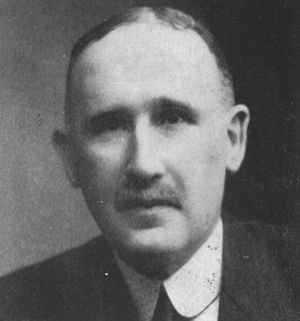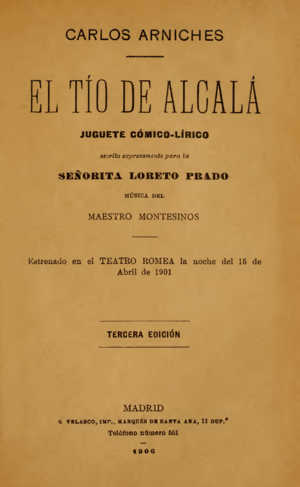Carlos Arniches facts for kids
Quick facts for kids
Carlos Arniches
|
|
|---|---|

Carlos Arniches
|
|
| Born | 11 October 1866 Alicante, Spain
|
| Died | 16 April 1943 (aged 76) Madrid, Spain
|
| Nationality | Spanish |
| Occupation | playwright |
Carlos Arniches Barreda (born October 11, 1866 – died April 16, 1943) was a very famous Spanish writer of plays. He was born in Alicante, Spain. His many plays became very popular in the early 1900s.
Arniches' plays often mixed different styles. He used ideas from the género chico (short, funny musical plays). He also used elements from zarzuela (Spanish musical theater). His plays sometimes had a grotesque style, which means they showed things in a strange or exaggerated way, often for comedy.
Contents
Early Life and Career
Carlos Arniches started his career by writing novels and working as a journalist. He wrote for newspapers. But soon, he found his true passion in theater.
In 1888, he published his first play, called Casa editorial. This was the start of his long and successful career as a playwright. A playwright is someone who writes plays for the stage.
His Plays and Style
Many of Arniches' plays were set in the poorer neighborhoods of Madrid. He often showed the daily lives of ordinary people. He used everyday language that people really spoke.
His plays were full of humor and often included songs, dances, and music. This made them very lively and entertaining for audiences. People loved his funny stories and relatable characters.
Praise from Other Writers
Even famous writers admired Carlos Arniches. In 1935, a well-known poet named Federico García Lorca praised him. Lorca was often very critical of plays written at that time.
But he said Arniches was "more of a poet than almost any of those who are writing theatre in verse at the moment." This was a huge compliment. It meant Arniches' writing was very artistic and special.
Plays After the Spanish Civil War
The Spanish Civil War was a difficult time in Spain's history. After the war ended in 1939, a new government took power. This government was led by General Franco.
They controlled what plays could be shown in theaters. Carlos Arniches' plays were often about everyday life and social situations. They were not very controversial. This meant they were among the plays allowed by the new government.
See also
 In Spanish: Carlos Arniches para niños
In Spanish: Carlos Arniches para niños


